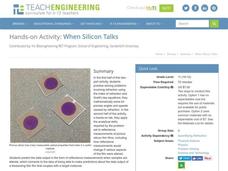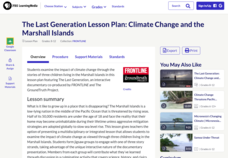University of Utah
Rational and Irrational Numbers
Conquer any irrational fears you might have of irrational numbers. As class members investigate how to represent numbers geometrically, they learn about rational and irrational numbers, including approximating and ordering rational...
Statistics Education Web
You Will Soon Analyze Categorical Data (Classifying Fortune Cookie Fortunes)
Would you rely on a fortune cookie for advice? The lesson first requires future statisticians to categorize 100 fortune cookie fortunes into four types: prophecy, advice, wisdom, and misc. The lesson goes on to have learners use...
Mathematics Assessment Project
Sorting Equations and Identities
Identify the identity. Learners first solve equations to find the number of solutions. Scholars then determine if given equations are always, sometimes, or never true, leading to the concept of identities.
Teach Engineering
Creepy Silly Putty
It might be silly to determine the creep rate of putty but groups will enjoy making different formulations of silly putty and playing with them to understand how the different mixtures behave. The second part of the activity has groups...
West Contra Costa Unified School District
Law of Sines
Laws are meant to be broken, right? Learners derive the Law of Sines by dropping a perpendicular from one vertex to its opposite side. Using the Law of Sines, mathematicians solve for various parts of triangles.
West Contra Costa Unified School District
Pythagorean Theorem and Its Converse
Challenge scholars to prove the Pythagorean Theorem geometrically by using a cut-and-paste activity. They then must solve for the missing sides of right triangles.
West Contra Costa Unified School District
Introduction to Trigonometric Functions
Scholars first learn the definitions of the sine ratio, the cosine ratio, and the tangent ratio. After mastering these definitions, they use the new information to solve triangles.
Teach Engineering
Exploring Capillary Action
Explore capillary action from different perspectives. In the fourth installment of a nine-part series, scholars perform several experiments to observe capillary action. They look at the meniscus of water in a glass, observe capillary...
Teach Engineering
Wetting and Contact Angle
Explore terminology related to water droplets. The sixth installment of a nine-part series teaches young scientists about wetting and contact angles between water droplets and surfaces. It also distinguishes between hydrophobic and...
Teach Engineering
Investigating Contact Angle
Discover the properties of water-loving and water-hating surfaces. In the seventh installment of a nine-part series, scholars explore hydrophilic and hydrophobic surfaces by conducting an experiment. They observe surface coatings,...
Teach Engineering
What Does Light See?
The second installment of a seven-part series focuses on the refraction of light and how it affects the colors we see. Learners consider how this concept connects to biosensors for cancer detection.
Teach Engineering
When Silicon Talks
Explore Snell's Law using thin films. In the fifth installment of a seven-part series, pupils solve a set of problems relating to Snell's Law and use this skill during an experiment requiring the collection of reflective measurements...
Statistics Education Web
I Always Feel Like Somebody's Watching Me
Future statisticians and potential psychics first conduct an experiment to collect data on whether a person can tell if someone is staring at them. Statistical methods, such as hypothesis testing, chi-square tests, binomial tests, and...
Teach Engineering
Quantum Dots and the Harkess Method
The Fantastic Voyage is becoming close to reality. The class reads an article on the use of nanotechnology in the medical field and participate in a discussion about what they read. The discussion method helps class members become more...
Noyce Foundation
Building Blocks
Building blocks have more uses than simply entertaining children. Young mathematicians calculate the volume of a given cube, and then calculate the volume and surface area of a prism formed from multiple cubes.
Teach Engineering
Earthquakes Living Lab: Geology and the 1906 San Francisco Earthquake
We can learn from the past to protect the future. Pairs look at two historical earthquakes: San Francisco, Calif., and Kobe, Japan. Pupils compare the two earthquakes and their impacts, then determine how engineers may use the...
PBL Pathways
Medical Insurance
Design a plan for finding the best health insurance for your money. Learners compare two health plans by writing and graphing piecewise functions representing the plan rules. Using Excel software, they create a technical report...
Prestwick House
Understanding Language: Slant, Spin, and Bias in the News
We live in a time of fake news, alternative realities, and media bias. What could be more timely than an activity that asks class members to research how different sources report the same topic in the news?
Beyond Benign
Leave Only Footprints
You don't need to tip-toe around an enlightening resource. Young environmentalists learn about ecological footprints in the fourth instructional activity of 15. Answering a questionnaire helps them see how their own families and homes...
Howard Hughes Medical Institute
Recent Adaptations in Humans
You've probably spent plenty of time discussing animal adaptations with your young biologists, but what about human adaptations? Explore the evolving traits of humankind through an interactive that combines text and video clips. Scholars...
California Department of Education
Me and My Career
Your career search starts here! Sixth grade scholars begin their journey toward college and career readiness in the first of a five-part series of lessons. Individuals identify where their interests lead them using the Holland code, then...
College Board
AP® Psychology Cognition and Language
I can remember what happened five years ago, but I can't recall what I did last week! High school psychology students analyze how memory, cognition, and language impact one another. Hands-on activities, memory exercises, and research...
PBS
The Last Generation: Climate Change and the Marshall Islands
Are some families down to their last generation? The final segment of a two-part climate change series investigates the vanishing Marshall Islands. Scholars divide into research teams to analyze three different individuals whose lives...
College Board
2018 AP® Biology Free-Response Questions
The average AP Biology score dropped in 2018 with the addition of more data tables and graphs. Offer additional practice free-response questions by using the questions from the 2018 AP exam covering phylogenetic trees, cell structure and...
Other popular searches
- Substitute Teacher Resources
- Science Teacher Resources
- Teacher Resources Tenses
- Math Teacher Resources
- Esl Teacher Resources
- Computer Teacher Resources
- Teacher Resources Visual Art
- Download Teacher Resources
- French Teacher Resources
- Teacher Resources Rating=3
- Math Teacher Resources K12
- Free Esl Teacher Resources

























